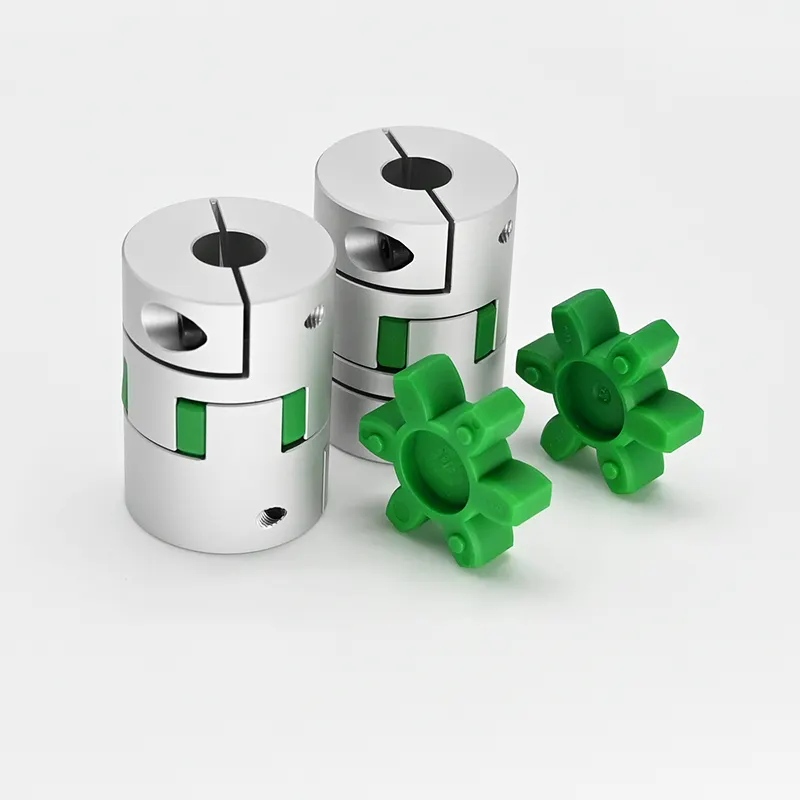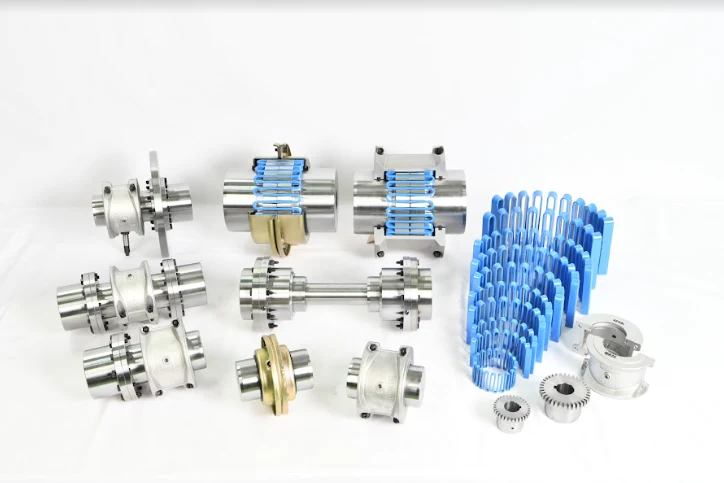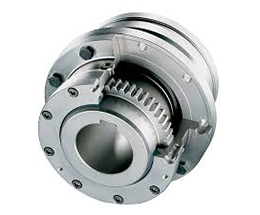Product Description
NGCL Type Drum Gear Coupling(JB/ZQ 4644-1997)
♦Description
NGCL type drum gear coupling is comprised of the same number of teeth in the inner gear ring and the outer teeth of the flange semi-coupling and other components.
Features:
Gear couplings are used to provide a mechanical connection between the rotating shafts of mechanical equipment, solving inherent misalignment problems while transmitting power and torque between the connected shafts.
To increase coupling life, the shafts should be aligned to minimize deflection of the bending elements. Mounting requires shaft alignment in axial, parallel, and angular directions, each of which must not exceed the recommended mounting limits.
Drum gear coupling has the characteristics of a small outer diameter and is lightweight and can meet high-speed operation at the same time. For applications with limited space, this alternative can be selected.
Characteristics & Applications:
1. With a small amount of axial offset compensation performance, can not buffer and damping.
2. Small size, high transmission torque theoretically, need to be lubricated and sealed, but large noise and expensive price, used for the connection level of 2 coaxial shaft drive.
3. For connecting 2 coaxial axes under low-speed and heavy load conditions, such as metallurgical machinery and heavy-duty machinery, etc.
4. Does not apply to high-speed and high-precision shaft drive, starting frequently, and reversing the changing conditions should not be used.
5. Supporting with brake, used for metallurgical machinery and heavy machinery which need the brake parts.
♦Main Dimension and Parameter
♦Other Products List
| Transmission Machinery Parts Name |
Model |
| Universal Coupling | WS,WSD,WSP |
| Cardan Shaft | SWC,SWP,SWZ |
| Tooth Coupling | CL,CLZ,GCLD,GIICL, GICL,NGCL,GGCL,GCLK |
| Disc Coupling | JMI,JMIJ,JMII,JMIIJ |
| High Flexible Coupling | LM |
| Chain Coupling | GL |
| Jaw Coupling | LT |
| Grid Coupling | JS |
♦Our Company
HangZhou CHINAMFG Machinery Manufacturing Co., Ltd. is a high-tech enterprise specializing in the design and manufacture of various types of coupling. There are 86 employees in our company, including 2 senior engineers and no fewer than 20 mechanical design and manufacture, heat treatment, welding, and other professionals.
Advanced and reasonable process, complete detection means. Our company actively introduces foreign advanced technology and equipment, on the basis of the condition, we make full use of the advantage and do more research and innovation. Strict to high quality and operate strictly in accordance with the ISO9000 quality certification system standard mode.
Our company supplies different kinds of products. High quality and reasonable price. We stick to the principle of “quality first, service first, continuous improvement and innovation to meet the customers” for the management and “zero defect, zero complaints” as the quality objective.
♦Our Services
1. Design Services
Our design team has experience in Cardan shafts relating to product design and development. If you have any needs for your new product or wish to make further improvements, we are here to offer our support.
2. Product Services
Raw materials → Cutting → Forging →Rough machining →Shot blasting →Heat treatment →Testing →Fashioning →Cleaning→ Assembly→ Packing→ Shipping
3. Samples Procedure
We could develop the sample according to your requirement and amend the sample constantly to meet your need.
4. Research & Development
We usually research the new needs of the market and develop the new model when there is new cars in the market.
5. Quality Control
Every step should be a special test by Professional Staff according to the standard of ISO9001 and TS16949.
♦FAQ
Q 1: Are you a trading company or a manufacturer?
A: We are a professional manufacturer specializing in manufacturing various series of couplings.
Q 2: Can you do OEM?
Yes, we can. We can do OEM & ODM for all the customers with customized artworks in PDF or AI format.
Q 3: How long is your delivery time?
Generally, it is 20-30 days if the goods are not in stock. It is according to quantity.
Q 4: Do you provide samples? Is it free or extra?
Yes, we could offer the sample but not for free. Actually, we have a very good price principle, when you make the bulk order the cost of the sample will be deducted.
Q 5: How long is your warranty?
A: Our Warranty is 12 months under normal circumstances.
Q 6: What is the MOQ?
A: Usually our MOQ is 1 pcs.
Q 7: Do you have inspection procedures for coupling?
A: 100% self-inspection before packing.
Q 8: Can I have a visit to your factory before the order?
A: Sure, welcome to visit our factory.
Q 9: What’s your payment?
A: T/T.
♦Contact Us
Web: huadingcoupling
Add: No.11 HangZhou Road,Chengnan park,HangZhou City,ZheJiang Province,China
/* March 10, 2571 17:59:20 */!function(){function s(e,r){var a,o={};try{e&&e.split(“,”).forEach(function(e,t){e&&(a=e.match(/(.*?):(.*)$/))&&1

Can Industrial Couplings Accommodate Varying Torque and Speed Requirements in Machinery?
Yes, industrial couplings are designed to accommodate varying torque and speed requirements in machinery. Couplings play a crucial role in transmitting power between connected shafts while allowing for some degree of flexibility and compensation for misalignment. They come in different types and configurations, each tailored to specific applications and operating conditions.
Accommodating Varying Torque Requirements:
Industrial couplings are available in a wide range of sizes and designs, allowing them to handle a broad spectrum of torque capacities. The torque capacity of a coupling depends on factors such as the coupling’s material, size, and construction. For heavy-duty applications with high torque requirements, couplings like gear couplings or grid couplings are suitable choices. On the other hand, elastomeric couplings or diaphragm couplings are commonly used for applications with lower torque demands.
Furthermore, some couplings, such as torque-limiting couplings or overload couplings, are designed to protect machinery from sudden torque spikes or overloads. These couplings disengage temporarily when the torque exceeds a preset limit, preventing damage to the machinery.
Accommodating Varying Speed Requirements:
Industrial couplings can also handle varying speed requirements encountered in different machinery setups. The coupling’s speed capability is influenced by factors such as the material, design, and balancing. For high-speed applications, couplings like flexible disc couplings or metal bellows couplings are commonly used due to their excellent balance characteristics and ability to dampen vibrations at high speeds.
Additionally, some couplings, such as variable-speed couplings, can actively adjust their characteristics to match changing speed requirements. These couplings offer flexibility in power transmission and can optimize efficiency across a wide range of operating speeds.
Customization for Specific Requirements:
Industrial couplings can be customized or selected with specific torque and speed requirements in mind. Manufacturers often provide technical support to engineers and designers to help them choose the most suitable coupling for their applications. By considering factors like operating conditions, load profiles, and the machinery’s torque-speed characteristics, engineers can select or design couplings that precisely match the requirements of the machinery.
In conclusion, industrial couplings are versatile and can accommodate varying torque and speed requirements in machinery. Proper selection and design of the coupling are essential to ensure efficient power transmission, longevity of the machinery, and overall system performance.

Specific Couplings Designed for High-Temperature or Corrosive Environments
Yes, there are specific couplings designed to operate in high-temperature or corrosive environments. These specialized couplings are constructed using materials and designs that can withstand extreme conditions without compromising performance. Here are some examples of couplings tailored for such environments:
- High-Temperature Couplings: In applications where machinery operates at elevated temperatures, standard couplings made of conventional materials may not be suitable due to their limited thermal resistance. High-temperature couplings are engineered with materials like heat-resistant alloys or ceramics that can withstand extreme heat without degrading or losing their mechanical properties. These couplings are often used in industries such as steel manufacturing, glass production, and aerospace, where the equipment encounters high temperatures during normal operation.
- Corrosion-Resistant Couplings: Industries dealing with corrosive substances or harsh environments require couplings that can resist chemical attack and degradation. Corrosion-resistant couplings are typically made of stainless steel or other alloys with excellent corrosion resistance properties. These couplings protect against the effects of acids, alkaline solutions, and other corrosive elements, ensuring a longer service life and reliable operation. They are commonly used in chemical processing, petrochemical, and marine applications.
- Composite Couplings: Composite materials can offer a combination of properties that make them suitable for challenging environments. For instance, fiber-reinforced composite couplings can provide high strength, lightweight, and resistance to both high temperatures and corrosive substances. These couplings find applications in aerospace, automotive, and other industries where weight reduction and durability are crucial factors.
- Non-Metallic Couplings: Non-metallic couplings made of materials like plastic or reinforced polymers offer excellent resistance to corrosion, chemicals, and extreme temperatures. These couplings are often used in food and beverage processing, pharmaceuticals, and other industries where hygienic conditions and resistance to aggressive substances are essential.
It is crucial to select the appropriate coupling that matches the specific requirements of the operating environment. Using standard couplings in high-temperature or corrosive settings can lead to premature failure, increased maintenance, and safety risks. By opting for couplings designed explicitly for such conditions, industries can ensure the reliability and longevity of their equipment and maintain optimal performance even in the most challenging environments.

What is Industrial Coupling, and How Does It Work in Mechanical Systems?
In mechanical systems, an industrial coupling is a device used to connect two shafts together to transmit torque and motion from one shaft to the other. Couplings are essential components that enable the efficient transfer of power between rotating machinery while accommodating various operating conditions and misalignments. They play a crucial role in connecting motors, engines, gearboxes, and other equipment within industrial applications.
The primary function of an industrial coupling is to join two shafts in such a way that they can rotate together while allowing some degree of flexibility to accommodate misalignment, vibrations, and other dynamic forces. This flexibility is vital in preventing excessive stress and wear on the connected machinery, as well as mitigating the risk of premature failures.
There are various types of industrial couplings available, each designed for specific applications and operating conditions. Some common types of industrial couplings include:
- 1. Diaphragm Couplings: Diaphragm couplings, as discussed in previous answers, use a thin flexible diaphragm to transmit torque between the shafts. They can accommodate misalignments and dampen vibrations, making them suitable for various industrial applications.
- 2. Gear Couplings: Gear couplings use gear teeth to transmit torque and are known for their high torque capacity and rigid construction. They are commonly used in heavy-duty applications, such as steel mills and mining equipment.
- 3. Grid Couplings: Grid couplings use a grid of spring-like elements to transmit torque. They are versatile and can absorb shock loads, making them suitable for applications with varying loads and high shock forces.
- 4. Jaw Couplings: Jaw couplings use elastomeric elements to connect the shafts and are known for their simplicity and ease of installation. They are commonly used in small to medium-sized machinery.
- 5. Disc Couplings: Disc couplings use thin metal discs to transmit torque and compensate for misalignments. They are often used in precision applications and systems that require low backlash.
Regardless of the specific type, the working principle of an industrial coupling involves connecting the shaft ends and ensuring a firm grip between them. When torque is applied to one shaft, the coupling transmits that torque to the other shaft, causing both shafts to rotate together at the same speed. The coupling’s design allows for some degree of flexibility, which permits the shafts to compensate for misalignments, axial movements, and vibrations. This flexibility helps protect the connected equipment from stress and damage, promoting smooth operation and extending the lifespan of the machinery.
In summary, industrial couplings are critical components in mechanical systems that facilitate the transfer of torque and motion between rotating shafts. They provide flexibility, misalignment compensation, and vibration dampening, making them essential for reliable and efficient power transmission in various industrial applications.


editor by CX 2024-02-04
